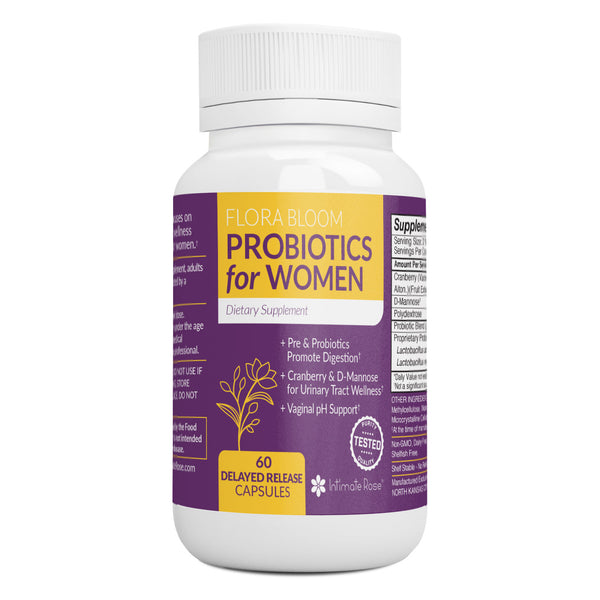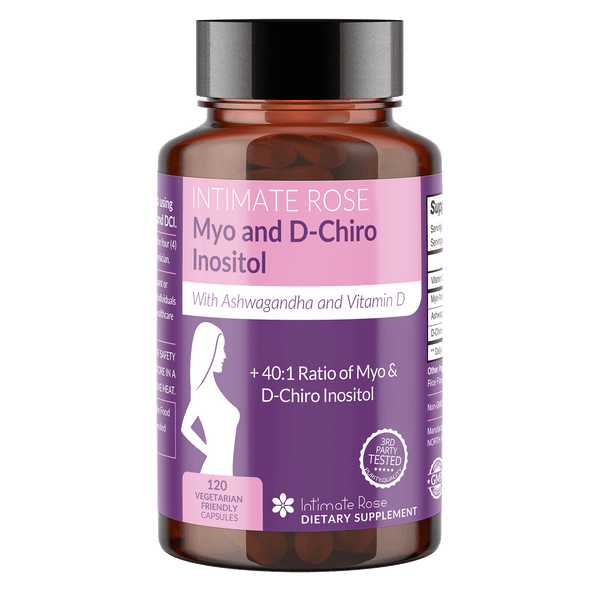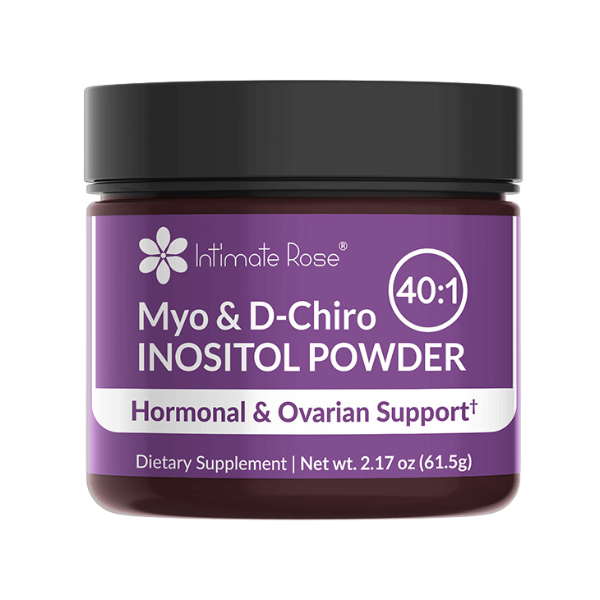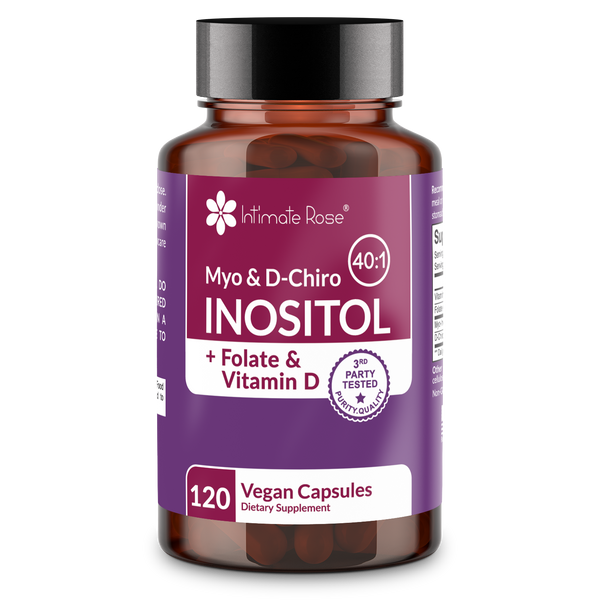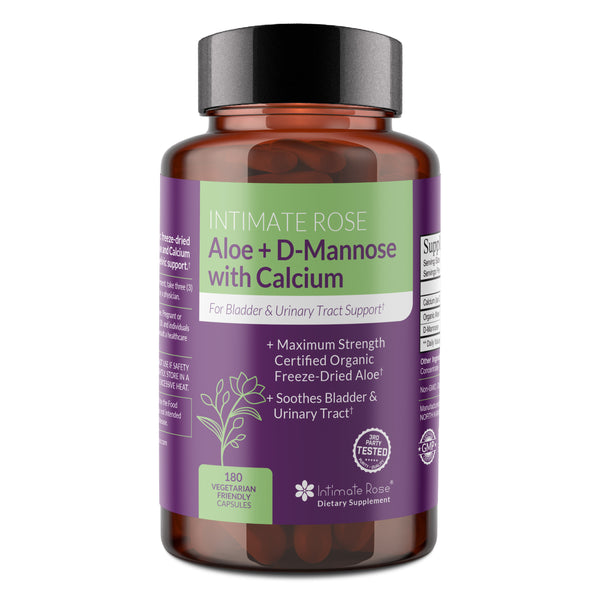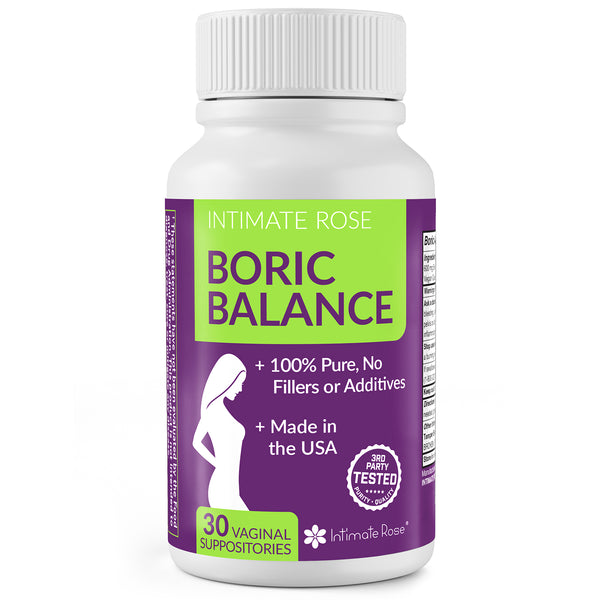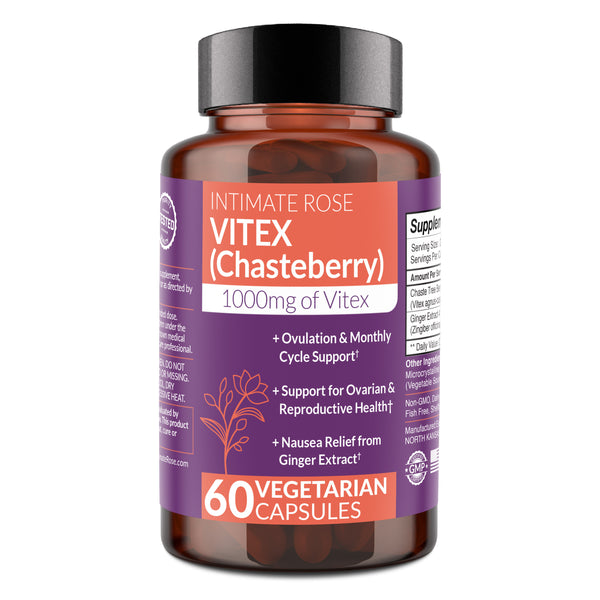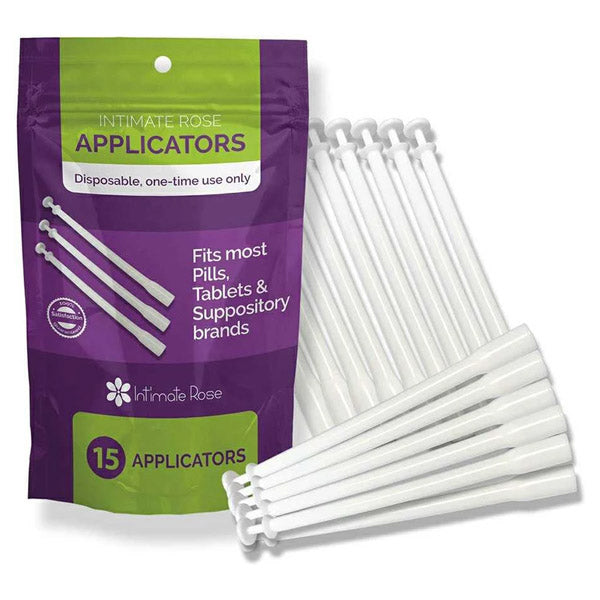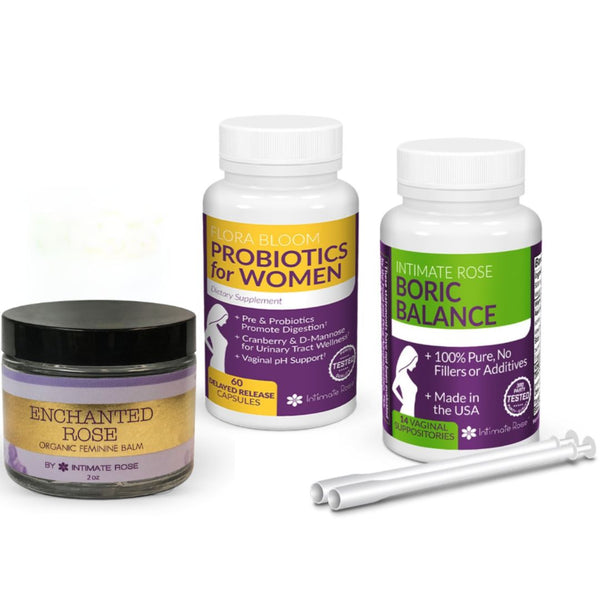Inositol--sometimes called Vitamin B8 (even though it is not a vitamin)--is a natural sugar that is probably already in your diet.
You may have seen it advertised as an over the counter supplement that can help with conditions such as polycystic ovarian syndrome, hormonal imbalances in women, metabolic disorders, and mental health conditions including depression and anxiety.
But what is inositol, can it really help, and is it safe to take?
Things Off Down There?
What is Inositol?
Inositol is a type of sugar found in many foods such as grains, beans, nuts, and fruits (Clements & Darnell, 1980).
There are different types of inositol; the most common one found in food is myo-inositol, but in inositol supplements you’ll often see it paired with D-chiro-inositol. When paired, these two inositols help the body process insulin, and have effects for other hormones associated with mood disorders and metabolic conditions.
Inositol Benefits
Inositol, a type of sugar that influences both the body's insulin response and several hormones associated with mood and cognition, offers several potential health benefits:
- Improves Mental Health: May help in treating conditions like depression, panic disorder, and obsessive-compulsive disorder.
- Polycystic Ovary Syndrome (PCOS): Helps in managing symptoms and improving fertility in women with PCOS.
- Blood Sugar Control: Aids in blood sugar control, potentially beneficial for people with diabetes.
- Improves Insulin Sensitivity: Can improve the body's sensitivity to insulin, important for metabolic health.
- Promotes Healthy Pregnancy: May reduce the risk of gestational diabetes when taken during pregnancy.
- Brain Health: Contributes to neurodevelopment and may protect brain cells.
- Mood Regulation: Helps in regulating neurotransmitters, potentially improving mood disorders.
- Metabolic Syndrome: May help in managing aspects of metabolic syndrome.
- Improves Sleep Quality: Has been linked to better sleep patterns in some studies.
- Reduces Anxiety Symptoms: Potential to alleviate anxiety symptoms due to its role in neurotransmitter signaling.
What is Inositol Used For?
Inositol is being recommended more frequently for the management of certain illnesses including PCOS, metabolic disorders, and mood disorders.
PCOS
Polycystic ovarian syndrome (PCOS) is a lifelong condition in women (or other people with ovaries) that impacts the levels of male and female hormones in the body.
This comes with many side effects, which can include:
- Male-pattern facial hair (hirsutism)
- Hormonal acne
- Irregular periods or no periods
- Anovulation and infertility
- Insulin resistance
- Depression, anxiety, and body image problems
Birth control pills are often prescribed to help with some of the hormonal problems associated with PCOS. However, there are several ways to relieve PCOS symptoms naturally, including diet, exercise, and supplements like myo-inositol.
Many of the side effects of PCOS patients come from an excess of androgens (male sex hormones). One study found that myo-inositol, D-chiro-inositol, or both taken together can help manage androgens in PCOS patients, leading to better results for menstruation, fertility, facial hair, and acne (Wojciechowska et al, 2019).
Another study examined overweight PCOS patients taking a supplement with a 40:1 ratio of myo-inositol and D-chiro-inositol, and found some evidence that the supplement might help reduce the risk of developing a metabolic disorder such as diabetes (Nordio & Proietti, 2012).
Metabolic Disorders
Inositol can mimic the effects of insulin, which means they can help process glucose and therefore lower blood sugar. In addition to helping PCOS patients manage their insulin and reduce their risk of developing a metabolic disorder, this effect can help manage disorders such as gestational diabetes and metabolic syndrome.
Gestational diabetes
Gestational diabetes is diabetes, generally type 2, which occurs at the onset of pregnancy (i.e. the person did not have diabetes before pregnancy). Those who develop gestational diabetes have up to a 14% chance of their diabetes lasting beyond pregnancy, increases the risk of the pregnant person developing diabetes later in life, and increases the risk of diabetes for the child born out of that pregnancy (American Diabetes Association, 2004).
One review of existing research on prevention of gestational diabetes looked at 71 trials including 23,000 women and found evidence that myo-inositol can help, though more research is needed.
The review also suggested that pregnancy-appropriate exercise and nutrition, the anti-diabetic medication Metformin, and Vitamin D (found in sunlight) might all help prevent gestational diabetes (Griffith et al, 2020).
Other Diabetes
Little is known about the relationship between inositol and type 1 or type 2 diabetes. One small study in Italy looked at the role of myo- and D-chiro-inositol supplements on 20 patients with type 2 diabetes.
The supplements did not reduce BMI or blood pressure, but patients did show a significant decrease in the level of sugar in their blood (Pintaudi, Di Vieste, & Bonomo, 2016).
While this study alone is not enough to recommend inositol for managing diabetes, it is promising, and we can hope more studies will be done to investigate this link in the future.
Metabolic Syndrome
Metabolic syndrome is not a disorder on its own, but rather a combination of disorders and symptoms--such as elevated blood sugar, blood pressure, and cholesterol--that increase your risk for developing complications such as heart disease and diabetes.
As with diabetes types 1 and 2, we have very limited research on the link between inositol and metabolic syndrome. One study of 80 postmenopausal women with metabolic syndrome found several beneficial effects of myo-inositol supplementation, including improved blood pressure and insulin resistance (Giordano et al, 2011).
Again, while this research is not enough, it is promising evidence to support inositol’s benefits in treating metabolic disorders.
Mood Disorders
Inositol shares a relationship with the hormones serotonin and dopamine--both associated with mental health conditions including depression, anxiety, PTSD, OCD, and ADHD. A 1997 review of inositol used as treatment for a variety of psychiatric disorders found that “inositol has therapeutic effects in the spectrum of illness responsive to serotonin selective re-uptake inhibitors, including depression, panic and OCD” (Levine). More research is needed to confirm the benefits for inositol and mood disorders.
Is Inositol Safe?
The U.S. Food and Drug Administration classifies Inositol as “GRAS” - generally regarded as safe (FDA, 2020). Research has shown very little risk for either humans or animals upon taking inositol, even during pregnancy--though you may have some side effects at higher doses.
For most conditions, the recommended dosage of inositol is 4 grams per day. When supplementation has exceeded 12 grams per day, side effects have included headaches, fatigue, dizziness, nausea, and other mild gastrointestinal problems (Formoso et al, 2019).
How does the Inositol supplement work?
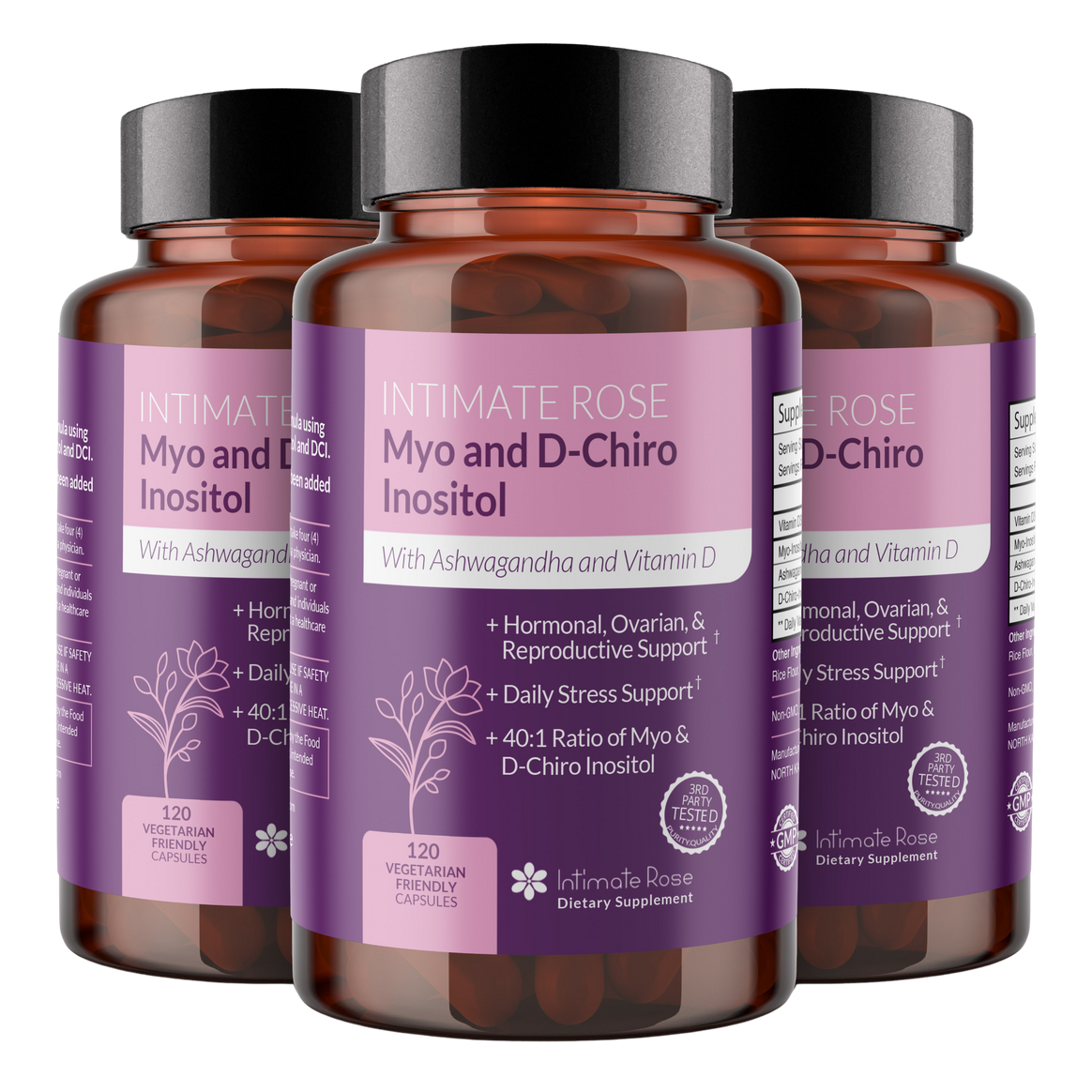
How to Use Inositol
Inositol is available as a supplement in tablet form or as a powder, and the following guidelines are recommended for using each correctly.
First, ensure that your inositol supplement, either in tablet or powder form, has a 40:1 blend of Myo-inositol to D-chiro-inositol for the ideal combination and best results. The recommended daily dose is 1200-8000 mg of MI per day, and 600-1000 mg of DCI and inositol supplements can be taken with or without food.
At Intimate Rose, where we help women overcome several health conditions, our advice is to take two of our 40:1 Myo and D Chiro Inositol capsules twice daily for optimal results in restoring hormone balance, metabolic wellness, and mental health. Because we understand how challenging the symptoms of these conditions can be, we also added ashwagandha and vitamin D to our inositol tablets for extra mood support and stress relief.
In fact, our natural supplements have made such a positive impact on women’s hormonal balance and overall wellness that we recently earned the Clean Label Project Purity Award for our commitment to rigorous testing and the highest standards of purity and safety.
To provide adjustable and individual dosing for those who find it difficult to swallow capsules or have a sensitive stomach, our 40:1 Myo and D-Chiro Inositol blend is also available in powder form. By mixing one scoop (2.05g) into a non-alcoholic drink, our inositol powder provides quick absorption and fast-acting hormone balance. For sensitive stomachs, mix only half a scoop twice per day into a beverage and drink it with a meal.
We also offer subscription options to ensure your supplements arrive each month for ongoing treatment, and can be easily cancelled when treatment is no longer required.
Conclusion
The naturally occurring sugar inositol has a number of potential benefits for your physical and mental health--especially for those with PCOS or mental health conditions, or who are at risk of developing a metabolic condition including gestational diabetes. Studies suggest that doses under 18 grams are very safe (even during pregnancy) and have virtually no side effects.
However, if you do have any side effects such as headaches, dizziness, fatigue, or nausea, talk to your doctor. And you should always consult with your doctor before trying any new supplements.
References
- Clements Jr, R. S., & Darnell, B. (1980). Myo-inositol content of common foods: development of a high-myo-inositol diet. The American journal of clinical nutrition, 33(9), 1954-1967. https://doi.org/10.1093/ajcn/33.9.1954
- Nordio, M., & Proietti, E. (2012). The combined therapy with myo-inositol and D-chiro-inositol reduces the risk of metabolic disease in PCOS overweight patients compared to myo-inositol supplementation alone. European review for medical and pharmacological sciences, 16(5), 575–581.
- Wojciechowska A, Osowski A, Jóźwik M, Górecki R, Rynkiewicz A, Wojtkiewicz J. (2019). Inositols’ Importance in the Improvement of the Endocrine–Metabolic Profile in PCOS. International Journal of Molecular Sciences, 20(22):5787. https://doi.org/10.3390/ijms20225787
- American Diabetes Association. (2004). Gestational diabetes mellitus. Diabetes care, 27(suppl 1), s88-s90. https://doi.org/10.2337/diacare.27.2007.S88
- Griffith RJ, Alsweiler J, Moore AE, Brown S, Middleton P, Shepherd E, Crowther CA (2020). Interventions to prevent women from developing gestational diabetes mellitus: an overview of Cochrane Reviews. Cochrane Database of Systematic Reviews 2020, Issue 6. Art. No.: CD012394 https://doi.org/10.1002/14651858.CD012394.pub3
- Pintaudi, B., Di Vieste, G., & Bonomo, M. (2016). The Effectiveness of Myo-Inositol and D-Chiro Inositol Treatment in Type 2 Diabetes. International journal of endocrinology, 2016, 9132052. https://doi.org/10.1155/2016/9132052
- Giordano, D., Corrado, F., Santamaria, A., Quattrone, S., Pintaudi, B., Di Benedetto, A., & D'Anna, R. (2011). Effects of myo-inositol supplementation in postmenopausal women with metabolic syndrome: a perspective, randomized, placebo-controlled study. Menopause, 18(1), 102-104 https://doi.org/10.1097/gme.0b013e3181e8e1b1
- Levine, J. (1997). Controlled trials of inositol in psychiatry. European neuropsychopharmacology, 7(2), 147-155. https://doi.org/10.1016/S0924-977X(97)00409-4
- FDA (Food And Drug Administration Department Of Health And Human Services) (2020). Subchapter B‐‐Food For Human Consumption; Sec. 184.1370 Inositol. https://www.accessdata.fda.gov/scripts/cdrh/cfdocs/cfcfr/CFRSearch.cfm?fr=184.1370.
- Formoso, G., Baldassarre, M., Ginestra, F., Carlucci, M. A., Bucci, I., & Consoli, A. (2019). Inositol and antioxidant supplementation: Safety and efficacy in pregnancy. Diabetes/metabolism research and reviews, 35(5), e3154. https://doi.org/10.1002/dmrr.3154

Things Off Down There?





